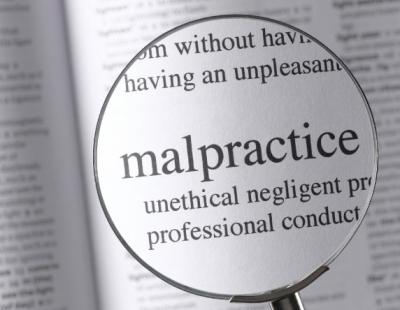 When patients are injured after visiting a physician or specialist, legal action is often pursued. Many patients believe that injury resulting from error is grounds for a medical malpractice lawsuit. However, several other factors may need to be considered before taking action. The process can become highly complex. An experienced medical malpractice attorney may be able to provide advice for a patient after hearing all details of a specific case.
When patients are injured after visiting a physician or specialist, legal action is often pursued. Many patients believe that injury resulting from error is grounds for a medical malpractice lawsuit. However, several other factors may need to be considered before taking action. The process can become highly complex. An experienced medical malpractice attorney may be able to provide advice for a patient after hearing all details of a specific case.
Filing a Medical Malpractice Lawsuit in Florida
With any type of medical malpractice, it is important to establish certain key factors. The patient must be able to provide evidence that a relationship existed between the doctor and patient. The patient must be able to identify ways in which the doctor was negligent. The patient must be able to establish a causal relationship between the negligence of the doctor and the injury. While these elements may seem straight forward, lack of ability to prove any one element may jeopardize the ability to collect compensation.
Grounds for filing a medical malpractice lawsuit may include, but are not limited to:
- Failure to follow up on patient complaints that are indicative of conditions
- Lack of communication between medical professionals regarding a patient that results in injury
- Improperly obtained informed consent for procedures or surgeries
- Failure to meet the acceptable standard of treatment
- Unsterilized or unsanitary conditions that result in infection or injury
- Inadequate hiring or training standards for staff that lead to inadequate care
- Failure to follow safety procedures
- Improper use of medical equipment
- Abnormal injuries, such as retained medical instruments after surgery
- Failure to order proper testing or incorrect conclusions drawn from test results
Types of Medical Malpractice Lawsuits
Medical malpractice can occur when physicians within a medical setting fail to use reasonable caution when providing treatment for a patient. This can incur lawsuits for medical errors such as surgical errors, anesthesia errors, or postoperative negligence. In addition, physicians may fail in upholding a duty of care by misdiagnosing conditions or ordering unnecessary surgeries.
Medical Malpractice Settings
Medical malpractice can occur in any type of medical setting, including:
- Hospitals
- Dentist offices
- Chiropractic offices
- Orthodontist offices
- Medical clinics
- Psychiatrists offices
- Gynecology offices
- Specialist’s offices
- Cosmetic surgery offices
- Pediatrician’s offices
Reasons Malpractice Lawsuits Are Turned Down
There are many reasons that a medical malpractice lawsuit may be turned down. One of the most common is the inability to determine negligence as a cause of injury. Errors in medical cases are common, and not all errors are evidence of negligence. If the course of action taken by the medical professional is similar to what other medical professionals would have done in the situation, a malpractice lawsuit may fail. Experienced medical malpractice attorneys may be able to make this determination after hearing the details of a case.
Causation Cannot Be Supported
In some cases, a lawsuit may be turned down because of the inability to support malpractice as the cause of injury. Even if bad care can be proven, a lawsuit may fail if the bad care itself did not cause any injury. This may also be the case if a misdiagnosis or delayed diagnosis did not change the outcome, as with certain inoperable conditions. It may take a significant amount of investigation to determine that causation of injuries cannot be supported.
Expected Damages versus Cost of Proceedings
Most malpractice suits are handled on a contingency basis, meaning that the attorneys do not get paid until the lawsuit has been settled. Once a lawsuit has been settled, the lawyer fees, the court costs, and reimbursement for any assistance that has been provided by the patient’s insurance must come out of the settlement. Once all of these fees have been paid, the patient receives the remaining compensation. If the expected damages are not sufficient to cover all of the fees it may not be worth it to file a lawsuit.
Sources:
Sohn, David. “Negligence, Genuine Error, and Litigation.” International Journal of Medicine 6 (2013): 49-56. National Center for Biotechnology Information. U.S. National Library of Medicine. Web. 3 Oct. 2014. <http://www.ncbi.nlm.nih.gov/pmc/articles/PMC3576054/>
“Statistical Data.” The Data Bank National Practitioner. U.S. Department of Health and Human Services, 1 Jan. 2013. Web. 3 Oct. 2014. <http://www.npdb.hrsa.gov/resources/npdbstats/npdbStatistics.jsp>
“What is Medical Malpractice?” Medical News Today. MediLexicon International, 14 Sep 2014. Web. 3 Oct 2014. <http://www.medicalnewstoday.com/articles/248175.php>
